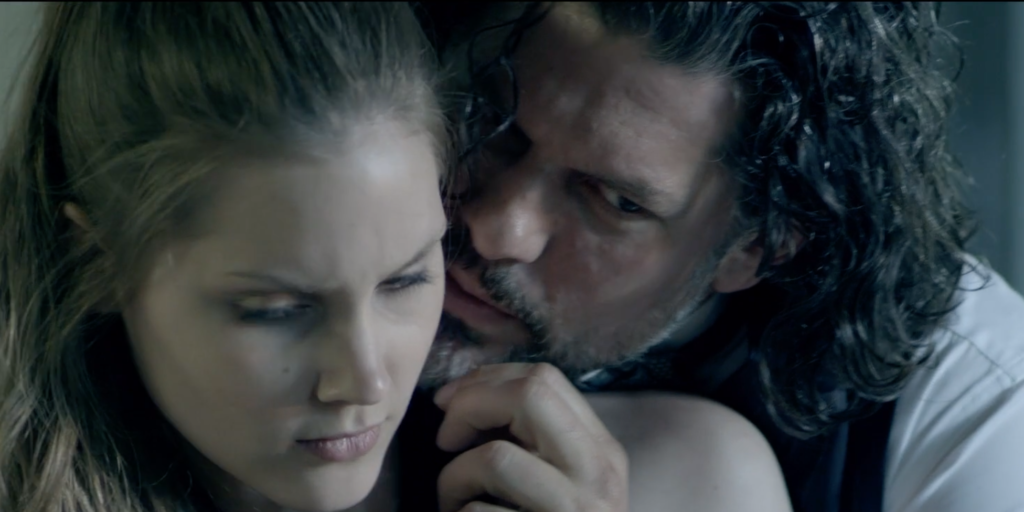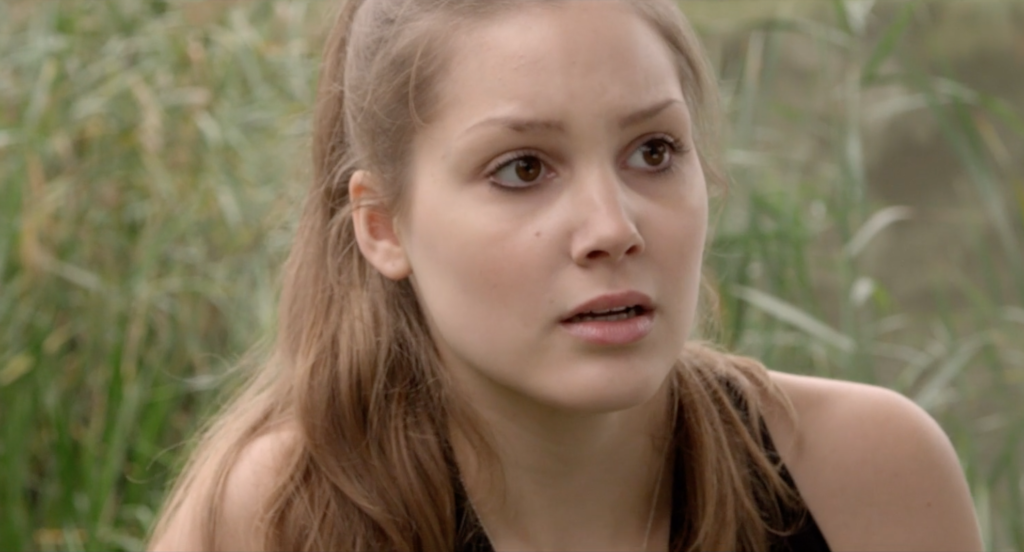“8 Remains,” an independent film by Juliane Block, requires strict attention. Its description, which bills it as a sort of after-life murder/mystery fails to do justice to what the film is about. It’s a mystery, sure, but an introspective one rather than a ‘who done it.’ In fact, at the film’s opening we are privy to a murder, know who has done it, and the picture’s protagonist, Talita (Maja-Celiné Probst) embarks on a quest not to discover her killer, but to stop him by entering a parallel mirror dimension. If all this sounds illusory and bizarre, it is; however, “8 Remains” takes viewers on a tour of deep, elemental concepts that makes it decidedly worth the effort.
“8 Remains” is substance driven rather than plot, though the story (written by Laura Sommer with dialogue polishing by Wolf-Peter Arand) is thoughtful and precise. The film’s production value is pristine, and it’s very clear that cinematographers Marc Oberdorfer and Marcus Schwemin know what they’re doing and aren’t afraid to take chances behind the lens. Focus on childlike objects, juxtaposed with horrific events works to highlight Block’s vision of lost innocence, while one shot toward the film’s near close, showing Talita and an older women embraced within a brightly-lit figure 8, is one of the film’s smartest and best shots.
With a dearth of plot, “8 Remains” tasks a lot of its actors, and they deliver. The film, which is clearly inspired by after-death dramas such as “What Dreams May Come” and horror films such as “A Nightmare on Elm Street” casts its characters in a dark realm where personal discovery lay the only way out. At the unfolding of this drama, Talita is front and center, and Probst delivers a physical performance that flies in the face of her young age of 21.
It’s the attention to detail that makes her performance work. From unique wardrobes such as dresses mixed with Chuck Taylors to a fragile innocence that Probst imbues Talita, she becomes the MVP of this film with little effort. Some scenes, such as when Talita saunters from one level of her dream world to the next are standard indie fare. However, others, such as a heart to heart she has with her younger and older self are the kind of introspective gold that drives a movie such as this.
It becomes clear early on that Talita, in trying to prevent her own murder, must face the demons of her past…the mistakes she’s made and people she’s hurt that led her to the decision(s) which led to her death. What is Block trying to say here? That the deleterious things that happen in our youths can shape us for years to come? It’s perhaps an obvious sentiment, but this is the first time in film I’ve felt so starkly what early life decisions and events can do to the adults in us that have had to withstand them.

It’s remiss to not give credit to Gregory B. Waldis, who plays Talita’s murderer Damian, who fills Block’s vision out wonderfully in his performance. He’s elegant, purposeful, ghastly, refined, and, well, evil. He stalks Talita through a dream world of his devising, a veritable Freddy Krueger who uses not knived fingers but threats and words to wound. Block makes an interesting choice by setting Damian in his gothic castle, garbed in a 3-piece-suit of Elizabethan proportions, yet gripped by psychopathic tendencies. One character remarks on Damian’s psychopathy, but it’s rather unnecessary; he toys with his victims (yes, there are more than one; no, that will not be spoiled here) in a way reserved for nightmares. I couldn’t imagine the film working the way it does without the level of sinisterness that Waldis brings to the role.
Block’s film is layered with all sorts of other goodies that make it enticing and enthralling, such as its cinematic symbolism, thoughtful character development, and personal exploration. The movie positions itself as an outward purveyor of misfortune stalking an unwitting victim, but it’s really more; it’s about personal victimhood and the roles we cast ourselves in when we don’t feel strong enough to get over our past and take control of our lives. One scene – involving a suicide victim Talita knew in life – is one of the film’s most regret-filled and somber. Another, as Talita slumps on the floor, begging for a second chance earns an easy mention as one of the most powerful scenes I’ve seen in an indie this year.
Apart from this, Block makes subtle commentary on misogyny and rape culture without being overbearing. “You’re so beautiful,” Damian utters many a time during the film’s run. But the phrase is thrown around not as admiration, but as expectation to his many women – often before violent acts by his own hand against them. One is particularly brutal, but will not be spoiled here for those who have not seen the film.
All in all, “8 Remains” is a well-made and thoughtful picture that watches well and is an encapsulating hour and eighteen minutes. It touches upon victimhood, salvation, fear, acceptance, and bravery in ways I haven’t seen displayed on screen for some time, and features stellar performances from its cast. It’s an anthem for change wrapped up in a murder mystery. It’s every bit as psychological as it is daring, and a wonderful picture to behold.
You can watch or purchase “8 Remains” on Amazon.com.



2 Comments
In my opinion it is great movie, definitely worth seeing.
I agree Svaba, thanks for your comment. This is a very detailed and insightful film.